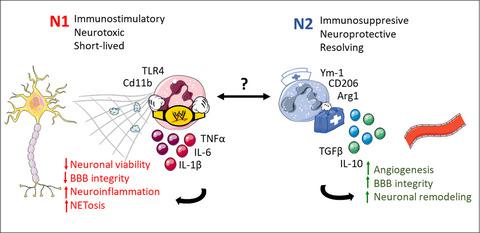当前位置:
X-MOL 学术
›
Immunol. Cell Biol.
›
论文详情
Our official English website, www.x-mol.net, welcomes your
feedback! (Note: you will need to create a separate account there.)
Dynamic roles of neutrophils in post-stroke neuroinflammation
Immunology and Cell Biology ( IF 3.2 ) Pub Date : 2021-04-24 , DOI: 10.1111/imcb.12463 Brooke J Wanrooy 1 , Shu Wen Wen 1 , Connie Hy Wong 1
Immunology and Cell Biology ( IF 3.2 ) Pub Date : 2021-04-24 , DOI: 10.1111/imcb.12463 Brooke J Wanrooy 1 , Shu Wen Wen 1 , Connie Hy Wong 1
Affiliation

|
Clinical trials involving the blockage of peripheral inflammatory leukocyte recruitment into the brain have puzzlingly led to either no significant improvement in stroke outcome, or even worsened outcomes and increased mortality, prompting a re-evaluation of our understanding into the neuroinflammatory processes after stroke. Whilst traditionally understood as simple effectors of the innate immune system, emerging research in vascular disease biology has redefined the neutrophil as a specialized and highly specific cell type with dynamic functional capacity. Indeed, emerging experimental evidence indicates that neutrophils display diverse roles in the acute stages of ischemic stroke with the ability to elicit both pro-inflammatory and anti-inflammatory effects. Currently, there is some uncertainty as to whether neutrophil diversity is beneficial or harmful in stroke as their interactions with the resident cells of the brain, such as microglia and neurons, would potentially elicit heterogeneous outcomes. Current treatments for patients with stroke aim to remove the vascular blockage and to restore blood flow, but there are currently no drug treatments for managing the loss of functional brain tissue nor restoration of microglial and neuronal damage. If these hypothesized wound-healing functions of neutrophils can be validated in a stroke setting, promoting the recruitment of this type of neutrophils into the injured brain tissue may form a promising therapeutic target for the majority of stroke patients currently without treatment. In this review, we will provide an update on recent research that has explored neutrophil heterogeneity in the neuroinflammatory cascade after ischemic stroke.
中文翻译:

中性粒细胞在卒中后神经炎症中的动态作用
涉及阻断外周炎性白细胞募集到大脑中的临床试验令人困惑地导致中风结果没有显着改善,甚至结果恶化和死亡率增加,促使我们重新评估我们对中风后神经炎症过程的理解。虽然传统上被理解为先天免疫系统的简单效应器,但血管疾病生物学的新兴研究将中性粒细胞重新定义为具有动态功能能力的特化和高度特异性的细胞类型。事实上,新出现的实验证据表明,中性粒细胞在缺血性中风的急性阶段发挥着不同的作用,具有引发促炎和抗炎作用的能力。目前,关于中性粒细胞多样性对中风是有益还是有害存在一些不确定性,因为它们与大脑中的常驻细胞(如小胶质细胞和神经元)的相互作用可能会导致异质性的结果。目前对中风患者的治疗旨在消除血管阻塞并恢复血流,但目前没有药物治疗来控制功能性脑组织的损失,也没有修复小胶质细胞和神经元损伤。如果中性粒细胞的这些假设的伤口愈合功能可以在中风环境中得到验证,那么促进这种类型的中性粒细胞募集到受伤的脑组织中可能会成为目前大多数未接受治疗的中风患者的有希望的治疗目标。在这次审查中,
更新日期:2021-04-24
中文翻译:

中性粒细胞在卒中后神经炎症中的动态作用
涉及阻断外周炎性白细胞募集到大脑中的临床试验令人困惑地导致中风结果没有显着改善,甚至结果恶化和死亡率增加,促使我们重新评估我们对中风后神经炎症过程的理解。虽然传统上被理解为先天免疫系统的简单效应器,但血管疾病生物学的新兴研究将中性粒细胞重新定义为具有动态功能能力的特化和高度特异性的细胞类型。事实上,新出现的实验证据表明,中性粒细胞在缺血性中风的急性阶段发挥着不同的作用,具有引发促炎和抗炎作用的能力。目前,关于中性粒细胞多样性对中风是有益还是有害存在一些不确定性,因为它们与大脑中的常驻细胞(如小胶质细胞和神经元)的相互作用可能会导致异质性的结果。目前对中风患者的治疗旨在消除血管阻塞并恢复血流,但目前没有药物治疗来控制功能性脑组织的损失,也没有修复小胶质细胞和神经元损伤。如果中性粒细胞的这些假设的伤口愈合功能可以在中风环境中得到验证,那么促进这种类型的中性粒细胞募集到受伤的脑组织中可能会成为目前大多数未接受治疗的中风患者的有希望的治疗目标。在这次审查中,











































 京公网安备 11010802027423号
京公网安备 11010802027423号